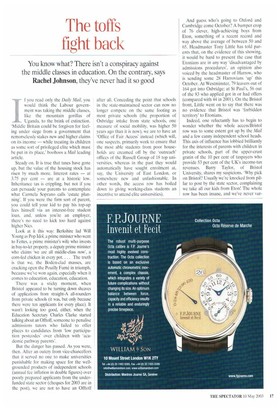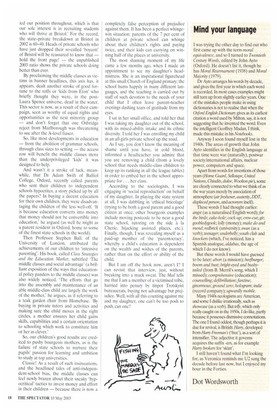The toffs fight back
You know what? There isn't a conspiracy against the middle classes in education. On the contrary, says Rachel Johnson, they've never had it so good I,. f you read only the Daily Mail, you would think the Labour government was taking the middle classes, like the mountain gorillas of
Uganda, to the brink of extinction. 'Middle Britain could be forgiven for feeling under siege from a government that remorselessly stakes new and higher claims on its income — while treating its children as some sort of privileged elite which must be put in its place,' boohoos a Mail leading article.
Steady on. It is true that taxes have gone up, but the value of the housing stock has risen by much more. Interest rates — at 3.75 per cent — are at a historic low. Inheritance tax is crippling, but not if you can persuade your parents to contemplate what Carmela Soprano calls 'estate planning'. If you were the firm sort of parent, you could tell your kid to pay his top-up fees himself via an interest-free student loan, and, unless you're an employer, there's no need to kick too hard against higher Nics.
Look at it this way: Berkshire lad Will Young as Pop Idol, a prime minister who went to Fettes, a prime minister's wife who invests in buy-to-let property, a deputy prime minister who claims 'we are all middle-class now', a corn-fed chicken in every pot. . . . The truth is that we, the Boden-clad masses, are cracking open the Pouilly Fume in triumph, because we've won again, especially when it comes to education, education, education.
There was a sticky moment, when Bristol appeared to be turning down sheaves of applications from straight-A all-rounders from private schools (it was, but only because there were ten applicants for every place). It wasn't looking too good, either, when the Education Secretary Charles Clarke started talking about an Offtoff, someone to penalise admissions tutors who failed to offer places to candidates from 'low participation postcodes' over children with 'academic pathway parents'.
But the danger has passed. As you were, then. After an outcry from vice-chancellors that it served no one to make universities punishable for making space for the wellgrounded products of independent schools (annual fee inflation in double figures) over poorly prepared applicants from the underfunded state sector (cheques for 2003 are in the post), we are not to have an Offtoff after all. Conceding the point that schools in the state-maintained sector can now no longer compete on the same footing as most private schools (the proportion of Oxbridge intake from state schools, one measure of social mobility, was higher 50 years ago than it is now), we are to have an 'Office of Fair Access' instead (which will, one suspects, primarily work to ensure that the most able students from poor households are creamed off by the 'outreach' offices of the Russell Group of 18 top universities, whereas in the past they would automatically have sought enrolment at, say, the University of East London, or somewhere new and unfashionable. In other words, the access row has boiled down to giving working-class students an incentive to attend elite universities). And guess who's going to Oxford and Cambridge come October? A bumper crop of 76 clever, high-achieving boys from Eton, something of a recent record and way above the average of between 50 and 65. Headmaster Tony Little has told parents that, on the evidence of this showing, it would be hard to present the case that Etonians are in any way 'disadvantaged by admissions procedures', an opinion also voiced by the headmaster of Harrow, who is sending some 28 Harrovians 'up' this October. At Westminster, 79 leavers out of 164 got into Oxbridge; at St Paul's, 56 out of the 83 who applied got in or had offers (compared with 44 in 2001). On the Bristol front, Little went on to say that there was no evidence that Bristol was 'forbidden territory' to Etonians.
Indeed, one reluctantly has to begin to wonder whether the whole access/Bristol row was to some extent got up by the Mail and a few canny independent school heads. This axis of influence has lobbied brilliantly for the interests of parents with children in private schools, part of the upper-crust gratin of the 10 per cent of taxpayers who provide 53 per cent of the UK's income-tax revenues, Barry Taylor, of Bristol University, shares my suspicions. 'Why pick on Bristol? Usually we're knocked from pillar to post by the state sector, complaining we take all our kids from Eton! The whole row has been insane, and we've never var ied our position throughout. which is that our sole interest is in recruiting students who will thrive at Bristol.' For the record. the state–private breakdown at Bristol in 2002 is 60-40. Heads of private schools who have just dropped their so-called 'boycott' of Bristol will be reassured to know that — hold the front page! — the unpublished 2003 ratio shows the private schools doing better than ever.
By proclaiming the middle classes as victims in banner headlines, this axis has, it appears, dealt another stroke of good fortune to the toffs or 'kids from Eton' who briefly thought they were, in the postLaura Spence universe, dead in the water. This sector is now, as a result of their campaign, seen as worthy of equal rights and opportunities as the next minority group — and don't forget that one Oxbridge reject from Marlborough was threatening to sue after the A-level fiasco.
So, like most developments in education — from the abolition of grammar schools, through class sizes to setting — the access row will benefit the middle classes more than the underprivileged 'kids' it was designed to help.
And wasn't it a stroke of luck, meanwhile, that Dr Adam Swift of Balliol College, Oxford, recently called parents who sent their children to independent schools hypocrites, a story picked up by all the papers? In buying a decent education for their own children, they were disadvantaging the children of the less well-off. 'It is because education converts into money that money should not be convertible into education,' he argued (as well he might as a parent resident in Oxford, home to some of the finest state schools in the world).
Then Professor Stephen Ball, of the University of London. attributed the achievements of our children to 'intensive parenting'. His book. called Class Strategies and the Education Market, subtitled The middle classes and social advantage (a brilliant exposition of the ways that educational policy panders to the middle classes) was also widely noticed. 'The efforts that go into the assembly and maintenance of an able middle-class child are largely the work of the mother,' he argues, as if referring to a teak garden chair from Homebase. 'By buying in private tutors and activities and making sure the child moves in the right circles, a mother ensures her child gains skills, capabilities and a certain orientation to schooling which work to constitute him or her as clever.'
So, our children's good results are credited to pushy bourgeois mothers, as is the failure of state schools to nurture their pupils' passion for learning and ambition to study at top universities.
Classic! As a result of such insinuations. and the headlined tales of anti-independent-school bias, the middle classes can feel newly brazen about their sneaky 'hypocritical' tactics to invest money and effort in their children — because there is now a completely false perception of prejudice against them. It has been a perfect whingewin situation: parents of the 7 per cent of children at private school can whinge about their children's rights and paying twice, and their kids can carrying on winning half of the places at university.
The most shaming moment of my life came a few months ago, when I made an appointment to see my daughter's headmistress. She is an inspirational figurehead at this small Church of England primary; the school hums happily in many different languages, and the teaching is carried out by staff of such devotion to the needs of your child that I often leave parent–teacher evenings dashing tears of gratitude from my eyes.
I sat in her small office, and told her that I was taking my daughter out of the school, with its mixed-ability intake and its ethnic diversity. I told her I was enrolling my child in an all-girls private school up the road.
As I say, you don't know the meaning of shame until you have, in cold blood, informed a headteacher you admire that you are removing a child (from a lovely school that needs middle-class children to keep up its ranking in all the league tables) in order to embed her in the school appropriate for. . . her class.
According to the sociologists, I was engaging in 'social reproduction' on behalf of my daughter. In playing the state system at all, I was dabbling in 'ethical bricolage' (trying to be both a good parent and a good citizen at once; other bourgeois examples include moving postcode to be near a good state school, tutoring on the side a la Cherie. hijacking assisted places, etc.). Finally, though, I was revealing myself as a paid-up member of the 'parentocracy', whereby a child's education is dependent on the wealth and wishes of the parents, rather than on the effort or ability of the child.
But I am off the hook now, aren't I? I can revisit that interview, just, without breaking into a muck sweat. The Mail tells me that I am a member of a victimised tribe, harried into penury by tinpot Trotskyist bureaucrats, buying not advantage but prejudice. Well, with all this counting against me and my daughter, one can't be too posh to push, can one?



































































 Previous page
Previous page